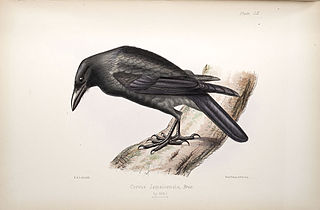
The Jamaican crow is a comparatively small corvid. It shares several key morphological features with two other West Indian species, the Cuban crow and the white-necked crow of Hispaniola, which are very closely related to it.

The black-hooded oriole is a member of the oriole family of passerine birds and is a resident breeder in tropical southern Asia from India and Sri Lanka east to Indonesia.

The black rail is a mouse-sized member of the rail family Rallidae that occurs in both North and South America.

The red-billed streamertail, also known as the doctor bird, scissor-tail or scissors tail hummingbird, is a species of hummingbird in the "emeralds", tribe Trochilini of subfamily Trochilinae. It is endemic to Jamaica and is the national bird of the country.

The anis are the three species of birds in the genus Crotophaga of the cuckoo family. They are essentially tropical New World birds, although the range of two species just reaches the United States.

The smooth-billed ani is a bird in the cuckoo family. It is a resident breeding species from southern Florida, the Caribbean, parts of Central America, south to western Ecuador, Brazil, northern Argentina and southern Chile. It was introduced to Galápagos around the 1960s and is potentially impacting native and endemic species across the archipelago.
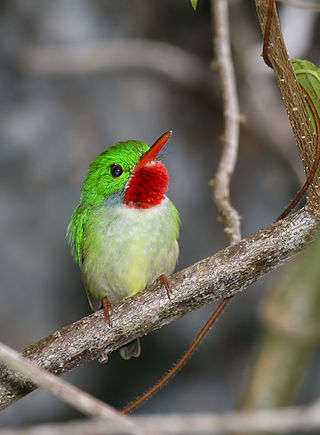
Todus is a genus of birds in the family Todidae, the todies, found in the Caribbean. It is the only extant genus within the family Todidae. The five species are small, near passerine birds of the forests of the Greater Antilles: Puerto Rico, Jamaica, and Cuba, with adjacent islands, have one species each, and Hispaniola has two, the broad-billed tody in the lowlands and the narrow-billed tody in the highlands.

Georg Dionysius Ehret was a German botanist and entomologist known for his botanical illustrations.
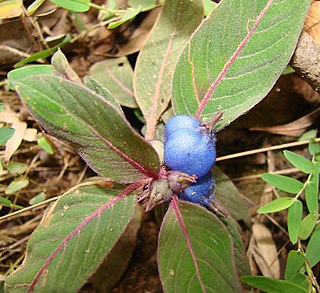
Coccocypselum is a genus of flowering plants in the family Rubiaceae. It is native to Mexico, Central America, the West Indies and South America. All species of the genus Coccocypselum are herbaceous with fleshy, blue or purple fruits, and 4-petaled flowers.
Patrick Browne (1720–1790) was an Irish physician and botanist.

Trixis is a genus of shrubs in the family Asteraceae, native to North and South America including the West Indies.
Bactris jamaicana is a spiny palm which grows in multi-stemmed clumps. It is endemic to Jamaica.

Critonia is a genus of flowering plants in the tribe Eupatorieae of the family Asteraceae.

Pharus, the stalkgrasses, is a genus of Neotropical plants in the grass family.

The Caribbean dove is a species of bird in the family Columbidae. It is found in Belize, the Cayman Islands, Colombia, Honduras, Jamaica, and Mexico. It has been introduced to the Bahamas.

Oryzomys antillarum, also known as the Jamaican rice rat, is an extinct rodent of Jamaica. A member of the genus Oryzomys within the family Cricetidae, it is similar to O. couesi of mainland Central America, from where it may have dispersed to its island during the last glacial period. O. antillarum is common in subfossil cave faunas and is also known from three specimens collected live in the 19th century. Some historical records of Jamaican rats may pertain to it. The species probably became extinct late in the 19th century, perhaps due to the introduction of the small Indian mongoose, competition with introduced rodents such as the brown rat, and habitat destruction.

Ehretia is a genus of flowering plants in the borage family, Boraginaceae. It contains about 50 species. The generic name honors German botanical illustrator Georg Dionysius Ehret (1708–1770).
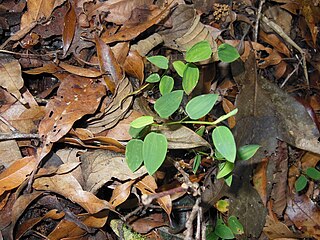
Zeugites is a genus of flowering plants in the grass family. Its species are native to the Caribbean, Mexico, Central America, and/or South America.
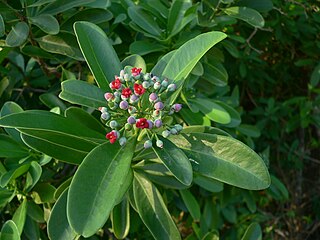
Canella is a monospecific genus containing the species Canella winterana, a tree native to the Caribbean from the Florida Keys to Barbados. Its bark is used as a spice similar to cinnamon, giving rise to the common names cinnamon bark, wild cinnamon, and white cinnamon.

Chiococca is a genus of flowering plants in the family Rubiaceae. It currently holds 23 species that are native to Florida, Texas, Mexico, Central America, much of South America, the West Indies, and the islands of Galápagos and Fernando de Noronha.

















